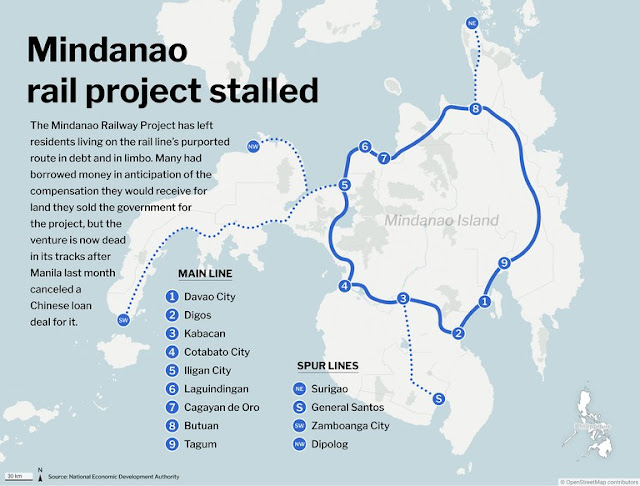China-funded Transportation Project in Southern Philippine Becomes Burden for Locals
pada tanggal
27 Agustus 2022
MANILA, LELEMUKU.COM - Far from becoming the once-touted star of the Philippines’ infrastructure program, a huge rail project that China was supposed to back in the south has become a millstone around residents’ necks, leaving many in debt and in limbo during the past four years.
Baca Juga
Ricky Tabay, a 52-year-old resident of Davao City, was told he had to give up a 7000-square-foot piece of land that he and his siblings had inherited from their father so the Mudiang Station, a stop on the Tagum-Davao-Digos segment of the railway, could be constructed.
“These people from the government were here and told us to secure the [document] requirements because if we did not sell our lands, they would be forcibly taken away by the government,” Tabay, who works as a meat vendor, told BenarNews recently during an interview at his ancestral house.
“Now we don’t know what’s next. How can we pay for the money we borrowed?” Tabay said, adding that his siblings had to take up menial jobs to contribute to the expenses for processing the documents.
BenarNews asked the Chinese Embassy in Manila why Beijing had not approved the Philippines’ loan application.
“[T]here is no such thing that China did not approve the loan application for the Mindanao Railway project,” the embassy said in an email.
“Teams from both sides will work closely to move this project forward.”
‘Waiting for nothing’
Like the Tabays, other residents have been left angry and confused, after what they were told was the cancelation of the much-touted Chinese loan for the Mindanao railway project. It was one of the country’s big-ticket infrastructure projects promoted under former President Rodrigo Duterte, who had served as mayor of Davao city for decades.
The government has yet to appraise the Tabays’ property, Ricky Tabay said.
“We hope the railway won’t push through anymore. Even if we get the money from the government, we’re worried that it won’t be enough to pay for a new lot or build a new house,” said Chiela Castañares, 36, Tabay’s sister.
“We were kept waiting and waiting for nothing. Just leave us alone with our land.”
The Department of Transportation blamed its consultant, Ove, Arup & Partners, and its sub-consultant and appraiser, Intech Property Appraisal Services, for the delays.
“The problems are mostly because of the appraisal consultant. The Department has no contribution to that,” Clipton Solamo, project manager of the Mindanao Railway Project, told BenarNews in a phone interview Wednesday.
He said Intech had been late with its submission even before the COVID-19 pandemic lockdowns. The firm also submitted erroneous assessments and appraisals, he added, setting the process back further.
“There was no justifiable reason that we could find. Every time they failed to submit appraisal reports, we would issue notices of citation, but until now they have not submitted everything,” Solamo said.
In San Miguel and Mankilam villages in Davao del Norte, many residents have bet on receiving money for their land from the government but are now in serious debt, said Mankilam community leader Hernani Catahum.
“A lot of people here borrowed money three to four years ago when DOTr said they will pay residents. Now, many are anxious because China backed out,” he told BenarNews, referring to the Department of Transportation.
“I just tell them to wait and not panic.”
Catahum, 51, said residents had grown tired of empty promises and plans.
“People here already went through different stages: from sadness of losing their houses, to a certain level of acceptance, to again frustration, and now anger,” Catahum said.
Take the case of Nenita Maldo, 65, from Tagum City in Davao del Norte, who has had to live with a leaky roof in the small neighborhood store she runs for two years now. She said residents were told not to make any modifications to their properties.
Maldo has no choice now but to place a pail below the four holes in her roof to catch the dripping water. If she’s unlucky, the pails overflow and she wakes up to a flooded living room.
“We feel our lives are pending. I have no money so I cannot transfer to a new place yet,” Maldo, who runs a small neighborhood store, said.
The Tagum City Planning Office, meanwhile, has been at the receiving end of the residents’ anger.
“I just tell everyone in our team to be patient because we are the frontliners here and we deal with frustrated and desperate residents. The problem is with the DOTr and their consultants,” said Leymeynard Opeña, an information systems analyst in the planning office.
Solamo, the manager of the Mindanao Railway Project, said the DOTr would conduct public consultations to address communities’ fears, but he didn’t say when.
Congressional probe
As the project’s future remains uncertain, it has become the target of a possible congressional investigation.
Lawmakers, including Paolo Duterte, the former president’s son who represents the first district of Davao city in Congress, filed a resolution calling for a probe but no schedule has been set.
Duterte noted that one of the city’s communities, Catalunan Grande, had also issued a resolution opposing the project for its “undue safety and health hazards.”
The transportation department, for its part, said it was ready to face an oversight investigation. (Camille Elemia / Jeoffrey Maitem | BenarNews)
Simak berbagai berita pilihan dan terkini dari Lelemuku.com selain "" di Grup Telegram Lelemuku.com. Klik link https://t.me/lelemukucom kemudian join/bergabung. Pastikan Anda sudah menginstall aplikasi Telegram di ponsel.












%202025.jpg)



